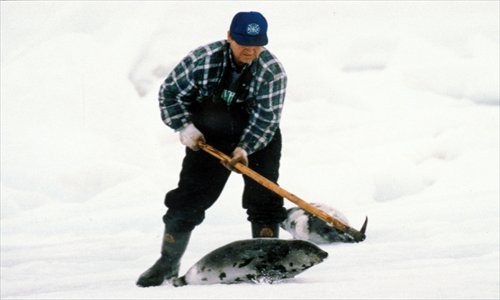
A Canadian sealer clubs a harp seal to death with a gaffe, in St. Lawrence, Quebec. Canada may be hoping China signs a trade deal to import seal products during Prime Minister Stephen Harper's visit to China. Photo: IC
While Canadian Prime Minister Stephen Harper kicked off his China trip by visiting the Temple of Heaven Wednesday, animal activists staged another protest against seal trade talks, sending a letter with Web users' comments to the Canadian embassy.
Environmental experts have also drawn attention to the possibility of the seal meat being contaminated with unsafe levels of heavy metals, such as mercury.
"We'd like to reveal some facts about the hazards of eating seal meat, and also how many people there are in China who are against Canada targeting us for the seal product trade," said Liu Huili, program manager for environmental NGO Green Beagle, who coordinated and organized the letter's delivery late Wednesday.
Although press reports yesterday focused on negotiations over oil pipelines, and the possibility a pair of pandas were bound for Toronto Zoo, a report by the Canadian Broadcasting Corporation on February 3, which listed "7 big topics for Harper's China trip," made no mention of the seal trade.
Forty animal rights groups nationwide cosigned the letter, which also included additional comments chosen from 60 microbloggers, amid concerns over both the cruelty of the trade, and potential risks from human consumption of seal meat.
"Seal meat is not only a product of cruelty, but it may pose a risk to human health, and studies have shown that cadmium, mercury and lead are all found in seal meat and blubber," said Rebecca Aldworth, director of Human Society International in Canada, via e-mail.
Ke Shen, professor at the School of Environment and Health at Beijing Jiaotong University, also thinks it would be unwise to trade seal meat as "it is not completely safe like the Canadian government assures, but polluted with heavy metals."
A report in the Toronto-based The Globe and Mail on February 2, quoted Harper as saying prior to his trip: "Our government will continue to vigorously defend this humane and highly regulated industry and to seek new international markets for Canadian seal products, including China."
The report also claimed that the reason the government has robustly backed the sealing industry, which represents only a small fraction of Canada's fishing industry on the Atlantic coast, is because "in Newfoundland and Labrador, the Conservatives hold many seats and it's where most of the country's 11,000 registered seal hunters live."
"There's no reason for Chinese to pay the price of losing dignity and respect in the world, as seal products would only represent a such a small proportion among total annual imports," said Qin Xiaona, director of the Capital Animal Welfare Association.
However, Mei Xinyu, a researcher with the Chinese Academy of International Trade and Economic Cooperation, affiliated to the Ministry of Commerce, worries the protest campaigns could harm Chinese international trade negotiations in the long run.
"I agree importing seal products from Canada is not crucial, as it would be a tiny percentage of China's $1 trillion imports a year," said Mei.
"But more important is that the interference in trade negotiations without any laws [to ban seal imports] to back their case up may cause violations of international trade rules, which Canada could then sue us over, for setting up trade barriers," noted Mei, "and we'll pay later."
In the East Asian region, Canada has already targeted South Korea and Japan as new markets for seal products, as well as China, according to an AFP report in December 2011. This comes after both Russia and the EU have banned imports of seal products.
Earlier this week, the Canadian embassy referred to a statement released on February 2 on the Canadian government website, which said that the Harper government supports Canadian sealers as a response to the issue.
Yesterday, Du Yan, publicity officer at the embassy, would give no comment about the content of bilateral trade talks.
"We shall keep a close eye on the Prime Minister's agenda in China, and protest as long as seal products are still being promoted," said Qin.

Copyright ©1999-2011 Chinanews.com. All rights reserved.
Reproduction in whole or in part without permission is prohibited.